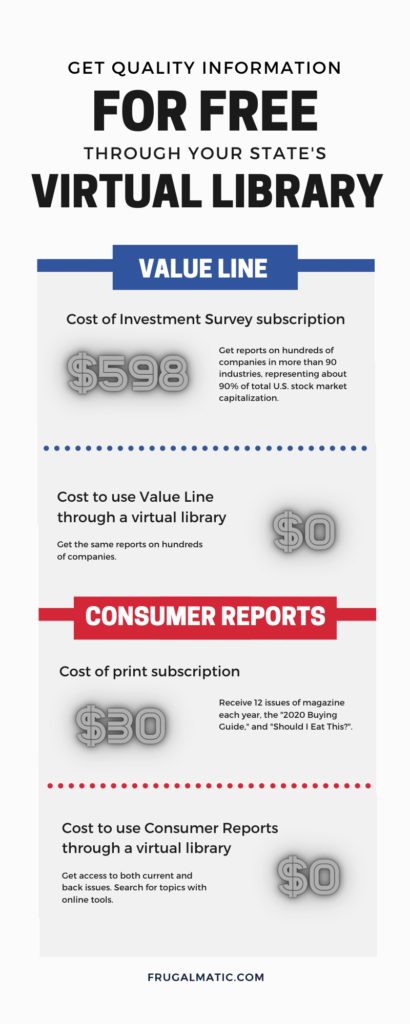This post was last updated on October 28th, 2021 at 08:49 pm
When you want to dig deeper than a Google search but don’t want to pay to get quality information, be sure to check out your local library’s and state’s online resources.
Many local libraries offer their own online resources while also participating in state programs that provide free access to a wide range of online publications and databases. Subscribing to these online resources on your own could cost hundreds of dollars. If your local library subscribes to a publication you want, you’ll need only a library card to access it. Access requirements for state virtual libraries (such as those listed at the end of this post) vary from state to state.
I use our local library’s resources to research financial and consumer products and services, and our kids use the learning tools. Here’s a list of some of my favorite publications offered through libraries:
Consumer Reports
I refer to this publication whenever our family makes a major purchase. We bought our last dishwasher, vacuum cleaner, lawn mower and mattress based on Consumer Report ratings.
I trust Consumer Reports more than review websites because Consumer Reports doesn’t accept advertising. Consumer Reports doesn’t have a financial interest in the products and services it reviews, unlike many other publications and websites. That doesn’t mean Consumer Reports is always right, but it’s a good defense against overhyped and overpriced products.
Value Line
Value Line provides analysis of stocks, categorizing them by sectors. It covers mostly U.S. companies and evaluates companies on several metrics, including financial health. Before investing in a company, I check to see whether Value Line covers it. If so, I know I can keep on top of any changes to the company or its sector through my library’s Value Line subscription.
Morningstar
It’s similar to Value Line, except covers mutual funds.
Britannica School
This was the premier encyclopedia that librarians recommended for research projects when I was a kid. Librarians still recommend it today, except now it’s online. It’s a great resource for elementary, middle and high school students searching for quality information. When your children are working on a research paper and need to use credible sources, they cannot go wrong referencing Britannica.
EBSCO Host
This is a clearinghouse for all sorts of research databases and e-journals. From information on health issues to auto repair, EBSCO provides access to dozens of publications. I use EBSCO Host to research health issues, including for my July 24 post, “Use your daily routine to get in better shape.”
Here are just a few of resources available through EBSCO Host: Education Resource Information Center (ERIC) provides access to education literature and research. Health Source: Consumer Edition offers health information on medicine, sports, nutrition and many more topics. Newswires complies news from wire services around the world.
Lynda.com
Now called LinkedIn Learning, this is an online learning platform that helps you learn new skills to start a business, pursue a new career or improve your skills in your current field. The site features a large collection of video tutorials in dozens of career fields. You might be able to find similar content on YouTube but likely not as comprehensive and well organized.

Look up your state’s virtual library
Whether your state and/or local library offers these resources depends on where you live. I can’t guarantee your library subscribes to any of the resources I listed here, but there’s a good chance it subscribes to some of them. If your local library lacks a robust virtual library, make sure to check your state’s virtual library offerings. Below is a list of state online resources.
It’s easy to fall into a habit of relying on Google to find information and concluding the information doesn’t exist if you can’t find it on Google. I know I’m guilty of thinking that. But there’s a lot of quality information out there not accessible through Google. It’s tucked away in these databases only accessible through local and state library programs. When you’re ready to dig deeper than a Google search, give these programs a shot. Then let me know whether you have success!

